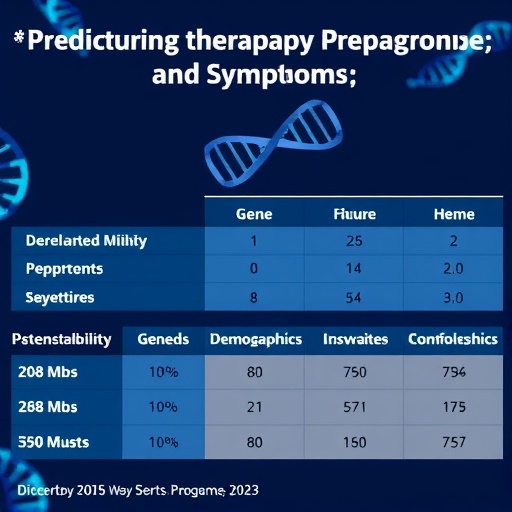In an era where digital health interventions are reshaping mental healthcare delivery, a groundbreaking study published in BMC Psychiatry propels our understanding of who truly benefits from internet-delivered cognitive behavioural therapy (ICBT) for depression and anxiety—and who might need more tailored approaches. While ICBT offers a beacon of hope for many grappling with mild to moderate psychiatric disorders, nearly half of patients experience insufficient symptom relief, underscoring the urgent need to unearth precise predictors that can forecast post-treatment outcomes.
This extensive investigation leveraged data from the Swedish MULTI-PSYCH database, a rich multimodal repository encompassing clinical, genetic, and sociodemographic factors of 2,668 individuals diagnosed with major depressive disorder, panic disorder, and social anxiety disorder. By integrating diverse datasets, the researchers sought to transcend traditional clinical predictors and explore how complex layers—including polygenic risk scores (PRS) for psychiatric disorders—could refine prognostic models, potentially informing personalized digital treatment plans.
Two linear regression models were deployed to unravel the predictors shaping symptom severity post-ICBT. The baseline model incorporated six well-established predictors, readily available in most clinical settings, essentially serving as a control framework. In contrast, the full model embraced a more comprehensive spectrum of variables, integrating six clinical metrics, 32 register-based sociodemographic indicators, and PRS spanning seven psychiatric disorders and traits. This multifaceted approach exemplifies the rising trend of combining genomic data with extensive patient registries to map mental health trajectories.
Findings revealed a significant yet modest enhancement in predictive power when expanding beyond traditional metrics. The baseline model accounted for 27% of variance in post-treatment symptom severity, whereas the enriched full model captured 34%. While this improvement may appear incremental, it underscores the latent value embedded in multimodal data integration, hinting at the potential of precision psychiatry to move beyond one-size-fits-all frameworks.
Intriguingly, the study identified novel predictors linked to higher symptom severity after ICBT, including comorbid autism spectrum disorder (ASD) and attention deficit hyperactivity disorder (ADHD). These neurodevelopmental conditions, long acknowledged for their complex interplay with mood and anxiety disorders, appear to critically influence response rates to digital interventions. Their presence suggests that overlapping symptom domains or cognitive profiles might interfere with the therapeutic effects of standard ICBT protocols.
Beyond neurodevelopmental comorbidities, socioeconomic factors surfaced as potent determinants. Receipt of financial benefits—a proxy for socioeconomic disadvantage—emerged as a significant predictor of poorer outcomes. This finding aligns with broader mental health research emphasizing the detrimental influence of economic hardship on treatment effectiveness, perhaps through elevated stress levels, limited access to supportive resources, or digital engagement barriers.
Prior use of psychotropic medications also correlated with greater post-treatment symptom severity, indicative of more entrenched or treatment-resistant cases. This marker may flag patients requiring augmented or alternative therapeutic modalities beyond self-guided or therapist-assisted online CBT formats. It suggests that pharmacological history can enrich predictive algorithms and guide earlier clinical decisions.
While the study harnessed the power of linear statistical models to dissect correlates, the authors advocate for embracing machine learning techniques as a logical progression. Such algorithms are inherently adept at modeling complex, nonlinear interactions and subtle dependencies among variables, potentially uncovering hidden patterns that escape conventional regression frameworks. This leap could enhance predictive accuracy and stratify patients with greater clinical nuance.
This research exemplifies a pivotal transition in psychiatric outcome prediction—from reliance on isolated clinical indicators to embracing comprehensive, data-driven portraits of patients. By weaving together genetic predispositions, sociodemographic contexts, and clinical histories, it broadens our conceptualization of treatment response heterogeneity in ICBT, paving the way for individualized care pathways.
However, the incremental gain in explained variance, while meaningful, spotlights the enduring challenges of mental health prediction modeling. Psychiatric outcomes evolve under the influence of fluid psychosocial dynamics, neurobiological processes, and environmental exposures that often elude quantification. Consequently, future studies must couple advanced computational techniques with enriched longitudinal datasets to capture temporal fluctuations and contextual factors shaping recovery trajectories.
Moreover, the generalizability of these findings warrants cautious optimism. The study sample, drawn from a Swedish clinical population with robust registry infrastructure, may differ from global patient cohorts in genetic backgrounds, healthcare access, and cultural attitudes toward digital therapy. Replication in diverse settings will be crucial to validate and refine predictive models that aspire to international applicability.
From a clinical perspective, integrating polygenic risk scores within routine psychiatric assessments remains in its infancy. Ethical considerations, data privacy, and practical implementation hurdles persist, underscoring the necessity for transparent communication and stakeholder engagement. Nonetheless, this study marks an important milestone in demonstrating the tangible benefits of incorporating genetic data alongside traditional predictors.
In conclusion, this extensive and methodologically sophisticated analysis charts a promising roadmap for advancing personalized mental health interventions. By highlighting key clinical comorbidities and sociodemographic vulnerabilities that elevate symptom severity after ICBT, the research invites clinicians and researchers alike to rethink treatment stratification and resource allocation. Harnessing computational innovations and expanding datasets will be essential to fully realize the transformative potential of predictive psychiatry in digital therapeutic landscapes.
As the mental health field continues its rapid digital evolution, such studies illuminate the intricacies underpinning therapeutic efficacy, urging a paradigm shift from generalized protocols to precision-tailored interventions. This could ultimately empower clinicians to preemptively identify patients at risk of suboptimal outcomes, customize treatment modalities, and optimize recovery pathways—thereby revolutionizing how we harness technology to combat depression and anxiety on a global scale.
Subject of Research: Clinical, genetic, and sociodemographic predictors influencing symptom severity following internet-delivered cognitive behavioural therapy for depression and anxiety disorders.
Article Title: Clinical, genetic, and sociodemographic predictors of symptom severity after internet-delivered cognitive behavioural therapy for depression and anxiety.
Article References:
Kravchenko, O., Bäckman, J., Mataix-Cols, D. et al. Clinical, genetic, and sociodemographic predictors of symptom severity after internet-delivered cognitive behavioural therapy for depression and anxiety. BMC Psychiatry 25, 555 (2025). https://doi.org/10.1186/s12888-025-07012-x
Image Credits: AI Generated




